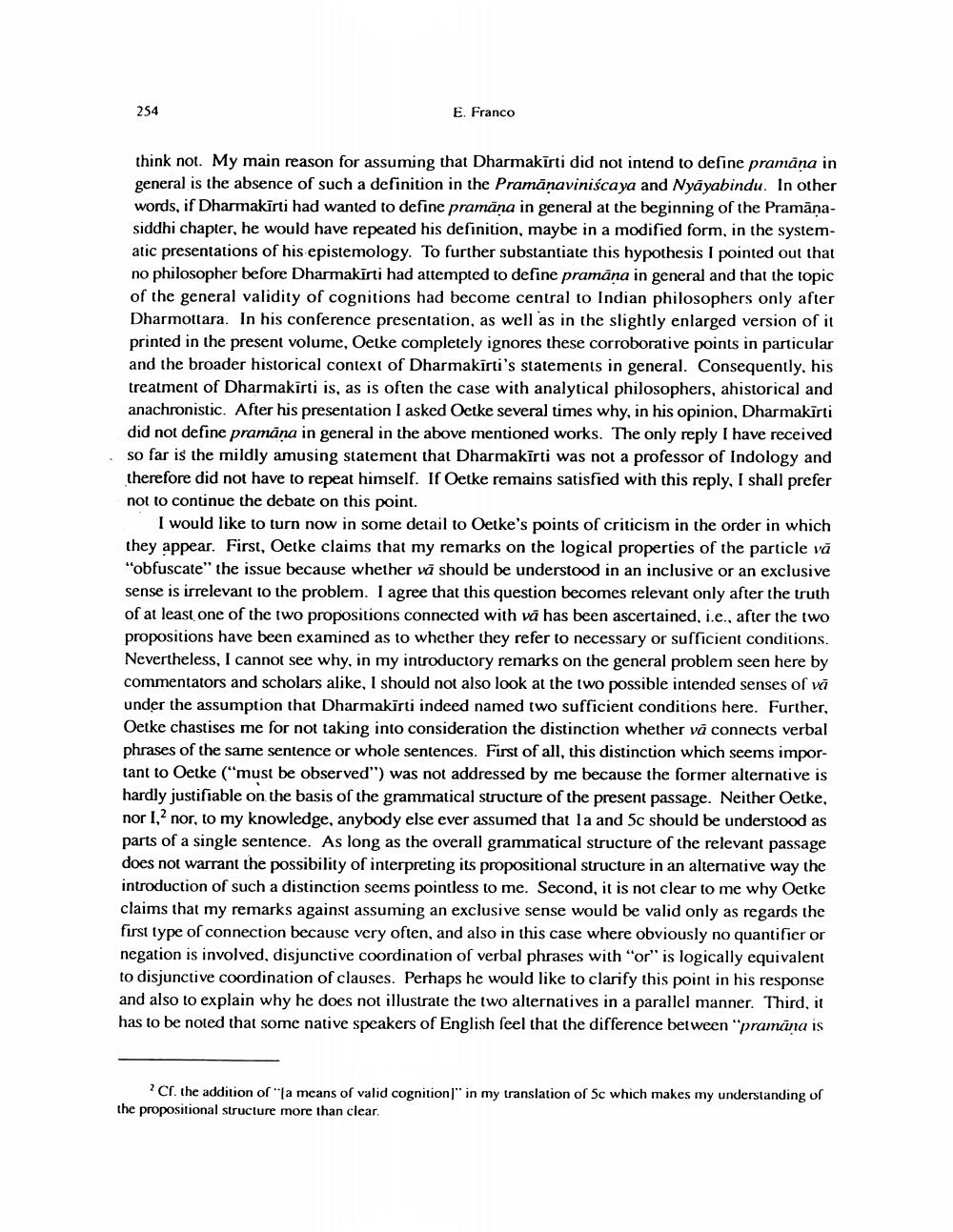________________
254
E. Franco
think not. My main reason for assuming that Dharmakirti did not intend to define pramana in general is the absence of such a definition in the Pramāṇaviniscaya and Nyāyabindu. In other words, if Dharmakirti had wanted to define pramana in general at the beginning of the Pramāṇasiddhi chapter, he would have repeated his definition, maybe in a modified form, in the systematic presentations of his epistemology. To further substantiate this hypothesis I pointed out that no philosopher before Dharmakirti had attempted to define pramāna in general and that the topic of the general validity of cognitions had become central to Indian philosophers only after Dharmottara. In his conference presentation, as well as in the slightly enlarged version of it printed in the present volume, Oetke completely ignores these corroborative points in particular and the broader historical context of Dharmakirti's statements in general. Consequently, his treatment of Dharmakirti is, as is often the case with analytical philosophers, ahistorical and anachronistic. After his presentation I asked Oetke several times why, in his opinion, Dharmakirti did not define pramāṇa in general in the above mentioned works. The only reply I have received so far is the mildly amusing statement that Dharmakirti was not a professor of Indology and therefore did not have to repeat himself. If Oetke remains satisfied with this reply, I shall prefer not to continue the debate on this point.
I would like to turn now in some detail to Oetke's points of criticism in the order in which they appear. First, Oetke claims that my remarks on the logical properties of the particle vă "obfuscate" the issue because whether va should be understood in an inclusive or an exclusive sense is irrelevant to the problem. I agree that this question becomes relevant only after the truth of at least one of the two propositions connected with va has been ascertained, i.e., after the two propositions have been examined as to whether they refer to necessary or sufficient conditions. Nevertheless, I cannot see why, in my introductory remarks on the general problem seen here by commentators and scholars alike, I should not also look at the two possible intended senses of vā under the assumption that Dharmakirti indeed named two sufficient conditions here. Further, Oetke chastises me for not taking into consideration the distinction whether va connects verbal phrases of the same sentence or whole sentences. First of all, this distinction which seems important to Oetke ("must be observed") was not addressed by me because the former alternative is hardly justifiable on the basis of the grammatical structure of the present passage. Neither Oetke, nor I,2 nor, to my knowledge, anybody else ever assumed that la and 5c should be understood as parts of a single sentence. As long as the overall grammatical structure of the relevant passage does not warrant the possibility of interpreting its propositional structure in an alternative way the introduction of such a distinction seems pointless to me. Second, it is not clear to me why Oetke claims that my remarks against assuming an exclusive sense would be valid only as regards the first type of connection because very often, and also in this case where obviously no quantifier or negation is involved, disjunctive coordination of verbal phrases with "or" is logically equivalent to disjunctive coordination of clauses. Perhaps he would like to clarify this point in his response and also to explain why he does not illustrate the two alternatives in a parallel manner. Third, it has to be noted that some native speakers of English feel that the difference between "pramana is
2 Cf. the addition of "la means of valid cognition]" in my translation of 5c which makes my understanding of the propositional structure more than clear.




